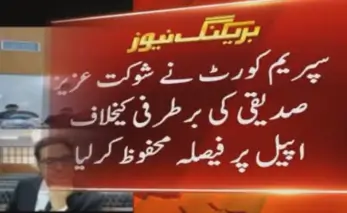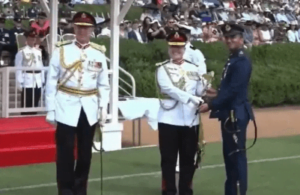SC Reserves Verdict in ex-judge Removal Case.
Ex-Judge’s Fate Hangs in the Balance: SC Reserves Verdict in High-Profile Removal Case
Pakistan’s Supreme Court has ignited a firestorm of anticipation by reserving its verdict in the case of former judge Shaukat Aziz Siddiqui’s removal.
This high-stakes saga, embroiled in accusations and counter-accusations, has kept the nation on tenterhooks.
Siddiqui’s lawyer, Hamid Khan, launched a salvo against the procedural fairness of his client’s removal.
He argued that Siddiqui was sacked without an investigation, a critical missing piece in due process.
The Attorney General, however, countered by presenting the rebuttal of key figures including former ISI chief Faiz Hameed and Brigadier Ramey. Both vehemently denied Siddiqui’s allegations, further muddying the waters of truth.
Read More: SC Verdict on PTI Bat Symbol
Chief Justice Qazi Faez Isa, presiding over the five-member bench, injected a dose of pragmatism. He questioned the very act of allowing such a sensitive speech while holding a judicial position. “People deserve the truth,” he declared, highlighting the weighty impact on institutional credibility.
Further emphasizing the case’s significance, the Chief Justice underscored its potential to set a precedent for the future of the judiciary.
“How can a constitutional office holder be removed without the proper procedure?” he asked, echoing concerns about due process and legal framework.
With stakes this high, both sides, represented by Khawaja Haris for Faiz Hameed and Ramey and Hamid Khan for Siddiqui, await the verdict with bated breath.
Read More: Supreme Court Defies Lifetime Disqualification
Public scrutiny intensifies as everyone seeks answers and closure to this intricate saga.
Truth hangs in the balance: Ex-judge’s speech ignites Supreme Court debate (Image of a gavel resting on a Pakistani court document)
Pakistan’s Supreme Court has become a stage for a high-stakes drama surrounding former judge Shaukat Aziz Siddiqui’s removal from office. Today’s hearing saw sharp exchanges, unanswered questions, and a critical dilemma: how to uncover the truth amidst conflicting claims and a controversial speech?
At the heart of the debate lies Siddiqui’s speech accusing powerful institutions of meddling in judicial affairs. While his lawyer, Hamid Khan, argued for due process and a proper inquiry, Faiz Hameed’s lawyer, Khawaja Haris, dismissed the allegations as baseless and claimed no formal investigation was conducted.
Chief Justice Qazi Faez Isa, presiding over the five-member bench, grappled with a fundamental question: how can the court reach a fair verdict without a proper factual inquiry? “We cannot decide by tossing a coin,” he declared, stressing the need for a meticulous search for truth.
The proceedings saw passionate arguments and probing questions:
- Justice Jamal Mandokhail: “Didn’t the speech imply the allegations were true? Was it appropriate for a judge to make such a statement?” (highlighting the ethical implications of Siddiqui’s actions)
- Chief Justice Isa: “There’s no ban on judges making speeches. If so, many judges would have been retired for speaking in bars. The issue is the points raised. Accepting the allegations is like declaring the council proceedings null and void.” (refocusing attention on the content of the speech and its consequences)
- Khawaja Haris: “The council says Siddiqui insulted the judiciary. Where does that come from? Which code of conduct section did he violate?” (challenging the specific basis for accusations against Siddiqui)
- Chief Justice Isa: “The federal government wants its appeal heard along with this case. There are also allegations of corruption against Siddiqui.” (introducing further complexities and potential avenues for investigation)
This intricate case transcends the fate of one individual. It touches upon crucial issues of institutional integrity, due process, and the delicate balance between freedom of speech and judicial ethics. The Supreme Court’s verdict, eagerly awaited by the nation, promises to set a precedent with far-reaching implications.
Supreme Court Grapples with Procedural Maze in Ex-Judge’s Removal Case (Image of a judge reviewing legal documents)
Pakistan’s Supreme Court courtroom became a battleground of procedure and principle today as the fate of former judge Shaukat Aziz Siddiqui hung in the balance. The air crackled with questions regarding due process, institutional autonomy, and the very nature of accountability.
Twisting the Procedural Labyrinth:
- Jamal Khan Mandokhail: “Can the secretary council be a complainant? Is this legally tenable?” His challenge aimed at the foundation of the removal proceedings against Siddiqui.
- Hamid Khan (Siddiqui’s lawyer): “No individual crime was committed. My client was judged on assumptions, not evidence.” He championed due process, highlighting inconsistencies in the case against Siddiqui.
- Chief Justice Qazi Faez Isa: “This is not about assumptions, Mr. Khan. We are under Article 184/3, seeking to uphold the law.” He underscored the seriousness of the matter and the need to adhere to proper legal procedures.
The Pushback:
- Salahuddin (Bar Council lawyer): “Sending this back to the Supreme Judicial Council is unwise. We need a fresh start, not a retread.” He voiced concerns about potential bias and the need for an independent investigation.
- Chief Justice Isa: “The court appointing an inquiry commission? That’s beyond our authority. Can we leave the fate of judges in the hands of junior police officers?” He emphasized the need for upholding judicial independence while navigating legal limitations.
A Tentative Pause:
- After a marathon of arguments, the verdict was reserved, with the judges requesting written submissions from all parties within three weeks.
- A door left open: Chief Justice Isa hinted at the possibility of further hearings “if deemed necessary.” The case remains fluid, with the potential for new twists and turns.
Beyond the Ex-Judge:
This intricate legal drama goes beyond the fate of one individual. It raises crucial questions about:
- Due process: Was Siddiqui denied a fair and impartial inquiry before his removal?
- Institutional accountability: Can powerful institutions police themselves, or is an independent oversight mechanism necessary?
- Judicial independence: How can judicial independence be balanced with the need for accountability?
The Supreme Court’s eventual verdict will set a precedent, shaping the future of judicial procedures and institutional checks and balances in Pakistan.
Note: The information above might not be accepted 100%. Please verify from your own sources. We will not be responsible for any kind of loss due to our content.
For more news, please visit Munafa Marketing.




